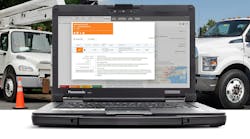Telematics support to help fleets convert data from engines running on compressed natural gas (CNG) and liquid natural gas (LNG) into diesel equivalent gallons (DGEs) for easier comparison performance with diesel-fired trucks is a new service being introduced by PeopleNet.
“As more fleets experiment with natural gas vehicle adoption to lower the cost of a fleet’s largest expense and reduce greenhouse emissions, they need the ability to compare fuel efficiency across a mixed-vehicle fleet,” noted Rick Ochsendorf, PeopleNet’s executive VP.
“Collecting and analyzing comparative fuel use is critical for efficiently determining the return on investment (ROI) of moving from diesel to natural gas,” he added. “In addition, the comparative data PeopleNet provides allows fleets to compare a driver’s miles per gallon (MPG) while in diesel vehicles with MPG in natural gas vehicles in order to preserve the integrity of driver incentive programs based on performance.”
PeopleNet’s new telematics option collects fuel consumed by CNG and LNG engines in pounds and automatically converts the usage to a diesel gallon equivalent (DGE) figure for more accurate and efficient fuel use and efficiency comparisons across mixed-vehicle fleets.
PeopleNet pointed to Saddle Creek Logistics, a 430-vehicle over-the-road trucking company with more than 100 trucks fueled by natural gas and another 100 on order, to exemplify how this telematics options benefits fleets.
“This engine reporting for natural gas has given us have the ability to segregate data by vehicle and driver, so we can analyze individual truck performance as well as individual driver performance,” said Mike DelBovo, Saddle Creek’s president.
“This is critical for identifying trucks that may need maintenance, and drivers with improper driving behaviors and excessive idle,” he added. “We want to help our drivers adopt habits that help them extend range, which is a huge issue right now since natural gas fuel stations are relatively scarce. It’s imperative that vehicles be able to travel 600 miles per fill.”


